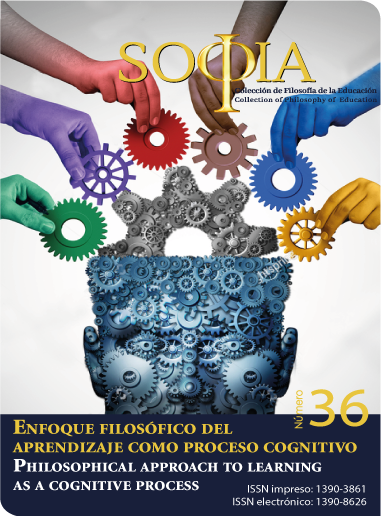Higher Education and Integral Development in Mexico
Main Article Content
Abstract
Article Details

This work is licensed under a Creative Commons Attribution-NonCommercial-ShareAlike 4.0 International License.
Authorship: The list of authors signing must include only those people who have contributed intellectually to the development of the work. Collaboration in the collection of data is not, by itself, a sufficient criterion of authorship. "Sophia" declines any responsibility for possible conflicts arising from the authorship of the works that are published.
Copyright: The Salesian Polytechnic University preserves the copyrights of the published articles, and favors and allows their reuse under the Creative Commons Attribution-NonCommercial-ShareAlike 3.0 Ecuador license. They may be copied, used, disseminated, transmitted and publicly displayed, provided that: i) the authorship and the original source of their publication (journal, editorial and work URL) are cited; (Ii) are not used for commercial purposes; Iii) mention the existence and specifications of this license.
References
Ávila Barrios, D. & Domínguez Pérez, D. (2019). Innovación y su correlación con el desarrollo económico de México: factores de detonación e impulso. En Comp. Sánchez Cano, J.: Cadenas de valor e innovación. Universidad Juárez del Estado de Durango, pp. 106-139. https://play.google.com/books/reader?id=3J6sDwAAQBAJ&pg=GBS.PP1&hl=es&lr=
Asociación Nacional de Universidades e Instituciones de Educación Superior [ANUIES] (2022). Anuarios estadísticos de educación superior. Ciclos escolares 2018-2019, 2020-2021 y 2021-2022. http://www.anuies.mx/informacion-y-servicios/informacion-estadistica-de-educacion-superior/anuario-estadistico-de-educacion-superior
Blancas Torres, E. (2018). Educación y desarrollo social. Horizonte de la Ciencia, 8 (14), 113-121. https://dialnet.unirioja.es/servlet/articulo?codigo=7762103
Cecchini, Simone (2020). Doble inclusión (social y laboral) en América Latina: un ejercicio de medición. En coord. Maldonado Valera & Marinho, M. & Robles, C.: Inclusión y cohesión social en el marco de la Agenda 2030 para el Desarrollo Sostenible. CEPAL, 111-119. https://repositorio.cepal.org/bitstream/handle/11362/45728/S2000057_es.pdf?sequence=1&isAllowed=y
De la Rosa Ruiz, D. & Giménez Armentia, P. & De la Calle Maldonado, C. (2019). Educación para el desarrollo sostenible en el papel de la universidad en la Agenda 2030. Revista Prisma Social, (25), 179-202. http://ddfv.ufv.es/bitstream/handle/10641/1691/Educaci%c3%b3n%20para%20el%20desarrollo.pdf?sequence=1&isAllowed=y
EDUCAUSE Horizon Report: Teaching and Learning Edition. https://library.educause.edu/-/media/files/library/2022/4/2022hrteachinglearning.pdf?la=en&hash=6F6B51DFF485A06DF6BDA8F88A0894EF9938D50B
Gozálvez Pérez, V. & Cortijo Ruiz, G. (2023). Desarrollo humano y redes sociales digitales. Sophia, Colección de Filosofía de la Educación, (34), 41-64. https://revistas.ups.edu.ec/index.php/sophia/article/view/6625
Instituto Nacional de Estadística, Geografía e Informática (2022). Producto Interno Bruto Trimestral (Series desestacionalizadas). México. https://www.inegi.org.mx/temas/pib/#Tabulados
Juárez Hernández, L. & Tobón, Sergio & Salas Razo, G. & Jerónimo Cano, A. & Martínez Valdés, M. (2019). Desarrollo sostenible: educación y sociedad. Revista Electrónica de Medio Ambiente, 20 (1), 54-72. https://www.ucm.es/data/cont/media/www/pag-129712/Art.3_M+A_VOL.20_2019..pdf
Ley General de Educación (2021). Cámara de Diputados del H. Congreso de la Unión. México. Reformada 30 de junio de 2021. https://www.diputados.gob.mx/LeyesBiblio/pdf/LGE.pdf
Márquez Jiménez, A. (2017). Educación y desarrollo en la sociedad del conocimiento. Perfiles Educativos, 39 (158), 3-17. https://www.scielo.org.mx/pdf/peredu/v39n158/0185-2698-peredu-39-158-00003.pdf
Martínez Díaz, L. (2020). La realidad de los sistemas educativos del siglo XXI. Una ruta de mejoramiento para responder a las necesidades de una sociedad en desarrollo creciente, del saber, digitalizada y globalizada. Oratores, 8 (12), 51-64. https://dspace2-umecit.metabuscador.org/bitstream/handle/001/4103/document-9.pdf?sequence=1&isAllowed=y
Martínez Rodríguez, F. & Amador Muñoz, L. (2010). Educación y desarrollo socio-económico. Contextos Educativos (13), 83-97. https://redined.educacion.gob.es/xmlui/bitstream/handle/11162/48143/01120123000039.pdf?sequence=1&isAllowed=y
Medina Alvarado, I. (2019). Desarrollo educativo, económico y social. Aportes de la teoría del capital humano en América Latina. Revista Caribeña de Ciencias Sociales, octubre 2019, pp. 1-7. https://www.eumed.net/rev/caribe/2019/10/desarrollo-educativo-economico.html
Obando Ibarra, A. (2018). Educación y desarrollo humano. Escribir la lectura. Revista Fedumar Pedagogía y Educación, 5 (1), 33-39. https://revistas.umariana.edu.co/index.php/fedumar/article/view/1682/1728
Organización de las Naciones Unidas (2017). Objetivos de desarrollo sostenible: La Asamblea General adopta la Agenda 2030 para el Desarrollo Sostenible. Última modificación 17 de noviembre de 2017. https://www.un.org/sustainabledevelopment/es/2015/09/la-asamblea-general-adopta-la-agenda-2030-para-el-desarrollo-sostenible/
Organización de las Naciones Unidas (2022). Declaración Universal de los Derechos Humanos. Última actualización 10 de diciembre de 2022. http://www.ordenjuridico.gob.mx/TratInt/Derechos%20Humanos/INST%2000.pdf
Pegalajar Palomino, M.C. & Burgos García, A. & Martínez Valdivia, E. (2022). Educación para el desarrollo sostenible y responsabilidad social: claves para la formación inicial del docente desde una revisión sistematizada. Revista de Investigación Educativa, 40 (2), 421-437. https://revistas.um.es/rie/article/view/458301/326711
Pérez Fuentes, D. & Castillo Loaiza, J. (2016). Capital humano, teorías y métodos: importancia de la variable salud. Economía, Sociedad y Territorio, 16 (52), 651-673. https://www.scielo.org.mx/pdf/est/v16n52/2448-6183-est-16-52-00651.pdf
Rodríguez Acosta, V. (2018). Educación para los derechos humanos. Un estudio necesario. Revista Estudios del Desarrollo Social: Cuba y América Latina, 6 (2), 160-177. http://scielo.sld.cu/scielo.php?script=sci_arttext&pid=S2308-01322018000200009
Sandoval Vásquez, J. & Hernández Castro, G. (2018). Crítica a la teoría del capital humano, educación y desarrollo socioeconómico. Revista Ensayos Pedagógicos, 13 (2), 137-160. https://www.revistas.una.ac.cr/index.php/ensayospedagogicos/article/view/11329/14493
Secretaría de Educación Pública (2022). Sistema interactivo de consulta de estadística educativa. México: Dirección General de Planeación, Programación y Estadística Educativa (DGPPyEE). https://www.planeacion.sep.gob.mx/principalescifras/
Villalobos López, A. (1986). Finanzas y empresas públicas municipales. México: Centro Nacional de Estudios Municipales, pp. 248. https://catalog.hathitrust.org/Record/101075512
Villalobos López, A. (2020). Economía pública municipal. MPRA Paper. University Library of Munich. Julio 2020, pp. 164. https://mpra.ub.uni-muenchen.de/103833/
Villalobos López, A. (2022). Conceptual framework for economic development and human development in Mexico. Journal of Economics, Management and Trade, 28 (8), 78-98. https://journaljemt.com/index.php/JEMT/article/view/1025/2050

